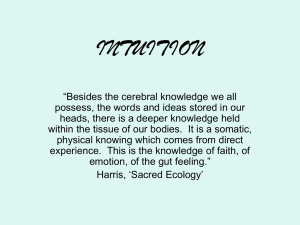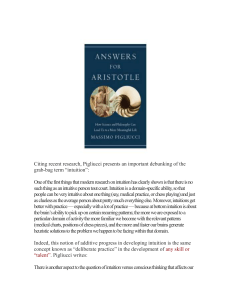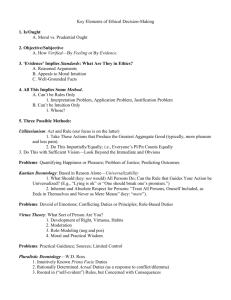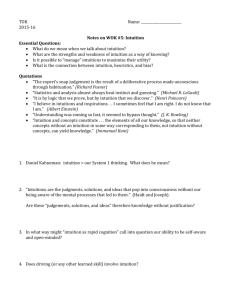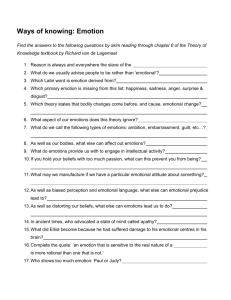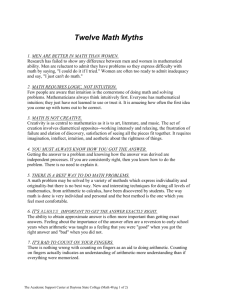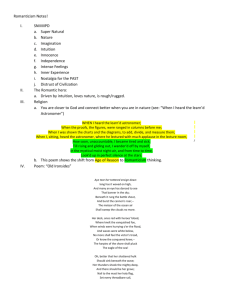Intuition and Equivalence
advertisement
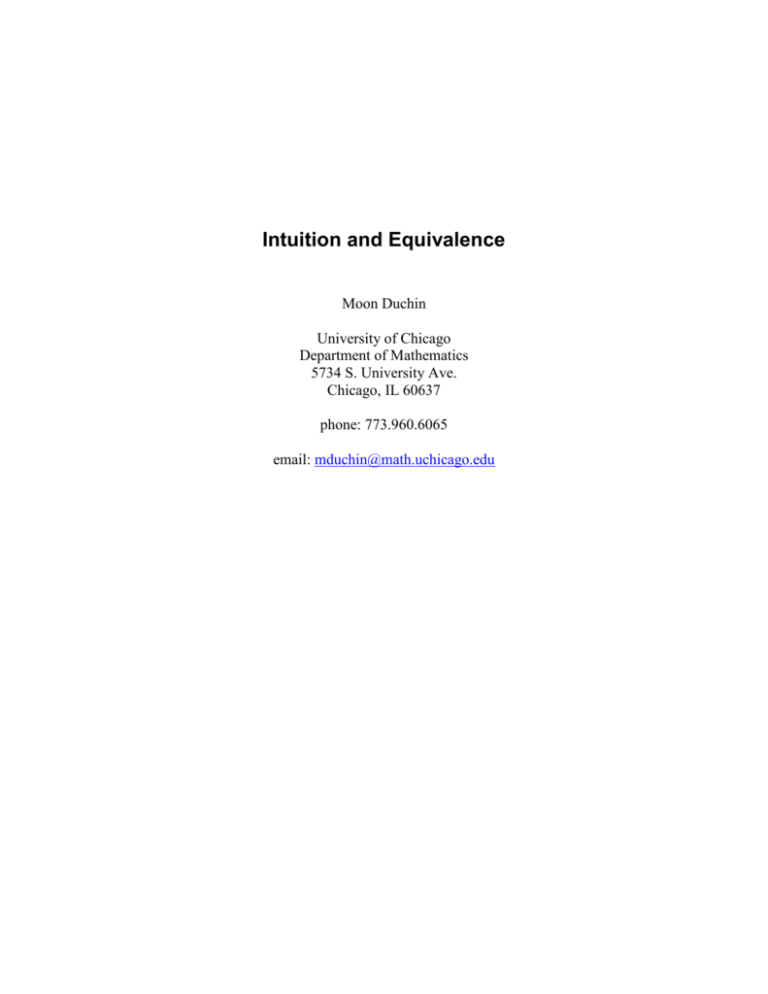
Intuition and Equivalence Moon Duchin University of Chicago Department of Mathematics 5734 S. University Ave. Chicago, IL 60637 phone: 773.960.6065 email: mduchin@math.uchicago.edu Intuition and Equivalence Abstract The eighteenth-century monk-mathematician Girolamo Saccheri and the modernday bioethicist Leon Kass both appeal to “repugnance” to persuade readers against accepting a controversial principle. Here, repugnance should be understood to be a shared intuition, or nearly-universal strong belief. The results for Saccheri were demonstrably wrong, and Kass, like many contemporary philosophers, must be left to contend with some of the undesirable properties of this sort of intuition. I will show by appealing to mathematical examples that intuition does not transfer between logically equivalent statements. This undermines several of its frequent uses in analytic philosophy. The remainder of the paper is devoted to exploring instances of current philosophical arguments, spanning a range of subfields, that are susceptible in different ways to the problems I identify. Introduction Analytic philosophy uses intuition so centrally and intimately that in fact the whole of the field can be defined as “the effort to attain maximum clarity regarding the content and basis of our intuitions” (Rethinking 8). I will focus on a special kind of intuition in this paper: intuitive knowledge of truth or falsity, and intuitive moral judgments.1 1 Because of this focus, I will not need to touch on the psychological and phenomenological literature on physical and sensory intuition. 1 Philosophers often appeal to shared intuition as a mechanism for making judgments. An assertion to be evaluated is intricately argued to have a specific logical relationship to a second assertion; then a strong and nearly universal intuition affirming or rejecting the second assertion is invoked. Frequently, for instance, the author will argue that a principle has a collection of logical consequences which are intuitively unattractive, undermining the desirability of the original principle. The usefulness of this process hinges on the presumption that the benefits of intuition transfer across logical implication. Prominent examples of this reasoning occur across philosophical subfields. When we are dissatisfied with the results of this procedure, we are inclined to critique the logical relationship of the statements, rather than the reliance on intuition as a guide. Many critiques can be (and have been) leveled at the reliance on intuition to discover facts or morality, as authors have cast doubt on its universality and have shown that it is heavily culturally determined. I will raise a more logistical objection without giving up the right to these critiques. My main argument will be that even if shared intuition were stable and independent of culture and historical moment, it would still have a problematic transfer across the operations of logic. Gary Gutting defines intuitions as “simply the rock-bottom beliefs [philosophers] find themselves forced to take as basic in their search for philosophical truth,” and indeed recognizes “the fact that we have no alternative to beginning with our own de facto intuitions, even though they have no certification beyond our inability to get past them” (Rethinking 6-7). Beyond the lack of positive certification, intuition has other demonstrable problems. 2 I will take it as so obvious as not to need demonstration that personal intuitions can be wrong and misleading. It takes more work, though perhaps not a great deal more, to show that strongly and widely held intuitions can be wrong and misleading as well. In fact, I will show something stronger: that intuition is not invariant under logical equivalence. In other words, two statements can be exhibited which are rigorously logically equivalent and such that strong intuitive belief held by virtually all people will hold one to be right, the other wrong.2 This shows as a corollary that intuition affirming one statement does not in general bolster its consequences; at the same time, intuition undermining the implications of a premise need not tarnish the premise. To accomplish this, I will take examples from mathematics, where the logical interdependence of statements can be studied with much greater rigor than in other forms of philosophy. Following that, I will look to examples in metaphysics, ethics, and bioethics to examine the consequences of my observations. Mathematics and the intuitiveness of axioms Euclid, the ancient Greek axiomatizer of geometry, laid down five basic postulates which he took to be self-evidently true—that is, five founding principles which were concordant with his geometric intuition. 1. A straight line segment can be drawn joining any two points. 2. Any straight line segment can be extended indefinitely in a straight line. Of course, the notion of agreement of “virtually all people” must be defined and defended. I will speak more about universality of intuition below, but I think that the standard of universality of intuitions met by my mathematical statements is at least as high as that used by the scholars whose work I describe (Parfit, Norcross, and Kass). 2 3 3. Given any straight line segment, a circle can be drawn having the segment as radius and one endpoint as center. 4. All right angles are congruent. 5. Given any straight line and a point not on it, there exists one and only one straight line which passes through that point and never intersects the first line, no matter how far they are extended.3 Several assumptions, in fact, are embedded in this axiom system. It is immediate to see that the fifth postulate does not hold in (usual three-dimensional) space, because for a fixed line and a point not on it, there are an infinity of choices meeting the requirement. So the two-dimensionality of the geometry at hand is built in to the famous Fifth. As it turns out, more is built in. Discoveries in the nineteenth century would show that the Fifth presumes that the ambient geometry is flat as well, while the other postulates are neutral with respect to curvature.4 On the way to the eventual embrace of alternate geometries (alternatives, that is, to Euclid’s flat plane), the Fifth was the subject of much debate. Euclid himself was dissatisfied with the idea that it could not be stated to sound as simple and natural as the others; in fact, he avoided employing the parallel postulate in the first twenty-eight proofs in his Elements and only came to it when he perceived it unavoidable. He was convinced In fact, this version of the Fifth is not the original one, but a restatement called Playfair’s postulate or the parallel postulate which is more easily parsed. Hugely many alternate restatements are possible, but this is the most frequent and classical. (Another, perhaps even more appealing to intuition, holds that a curve which is equidistant from a straight line must itself be a straight line. Yet another version says that every triangle has internal angles which add to 180 degrees.) 4 This requires that the notion of a “straight line” be replaced with the more general idea of a geodesic. Then the first four postulates make sense in model spaces of arbitrary curvature. 3 4 that there was a proof of the Fifth from the others, meaning that it was not independent and in this way was actually redundant and could be removed in the name of elegance. Euclid never succeeded in establishing the logical relationship of the Fifth postulate to the first four, and neither did his contemporaries. After apparently lying idle for hundreds of years, Greek geometry enjoyed a major rebirth of interest in the Arab world, where scholars resumed Euclid’s efforts to “prove” the parallel postulate in the ninth through thirteenth centuries (Studies 31-42). Later, a Jesuit priest named Girolamo Saccheri (1667-1733) devoted the bulk of his career to the same task, that of completing Euclid’s project and showing that the Fifth follows from the acceptable four. I will focus attention on the well-known story of Saccheri’s attempts, although he may have been anticipated by Arab mathematicians of several centuries earlier. Saccheri employed the method of proof by contradiction: he assumed the first four and the negation of the Fifth, then endeavored to find a logical contradiction. Had he found one, this would indeed have shown that the first four suffice to prove the Fifth. No contradiction, strictly speaking, emerged, though he did discover a number of statements which seemed impossible—he found, for instance, that rectangles could not exist in his axiom system.5 Desperately, though he surely realized that his project had failed in its goals, he declared his findings (like the nonexistence of rectangles) to be “repugnant to the nature of the straight line,” a bad enough sin when no contradiction is to be found. His 5 The axiom system obtained by assuming that a fixed line has no parallels through a fixed point is modeled by a sphere, where the role of lines is played by great circles (circles as large as the equator). No two lines are parallel on the sphere because any two great circles must intersect (in an antipodal pair of points, in fact). There are no figures on a sphere whose edges are arcs of great circles and which have four right angles—that is, there are no rectangles—as Saccheri found. If, instead, the existence of several parallels is taken as an axiom, the model space is called hyperbolic instead of spherical, and again there are no geodesic rectangles. Note too that spherical geometry has triangles whose angles must sum to more than 180 degrees, while hyperbolic triangles always contain less than 180 degrees. From this characterization, the nonexistence of rectangles follows easily (because a rectangle contains 360 degrees but can be decomposed into two triangles). 5 subsequent book bore the trumpeting title Euclid Freed of Every Flaw (Euclides ab omni naevo vindicatus). In this case, then, strong intuition led Saccheri to a now-provably-false conclusion: that the parallel postulate was a logical consequence of Euclid’s other four. It was only in the next century, after a wait of two millennia, that four mathematicians more-or-less independently realized that alternatives to the parallel postulate would produce viable alternate geometries.6 In fact, the bizarre-seeming statements considered by Saccheri to be tantamount to logical contradiction were valid theorems of hyperbolic and spherical geometry. Saccheri’s story is particularly interesting for the present discussion for two reasons. First, his appeal to “repugnance” resonates remarkably well with a current debate in bioethics, which I will discuss below with the work of Leon Kass. Second, the universality of his intuition should be familiar to philosophical readers since it was vigorously and explicitly defended by Kant as the very basis of geometric and spatial reasoning. A second example comes from considering the hotly debated Axiom of Choice.7 Consider the following four statements. Statement 1 (Axiom of Choice): For any collection of sets, it is possible to choose one representative from each set. 6 Lobachevsky, Riemann, Bolyai, and Gauss all have claims on independently arriving at the notion of a non-Euclidean geometry. For this part of the history, any modern text on the history of mathematics will suffice. 7 In fact, this axiom shares some history with the parallel postulate: it was originally considered to be a clearly true statement, but ultimately discovered to be independent of the other axioms of set theory (the six Zermelo-Frankel axioms, denoted ZF). This meant that the Choice principle could be either upheld or denied along with ZF, so that it deserves the status of an axiom itself. 6 Statement 2 (The Banach-Tarski Paradox, weak form): It is possible to partition a solid ball in three dimensions into five sets, then act on the five pieces by a series of rigid motions (in fact, just rotations will do), such that after the motions there will be two solid balls reassembled, each of the same volume as the original ball. Statement 3 (The Trichotomy Law): Every real number is either zero, positive, or negative. Statement 4 (The Well-Ordering Principle): For any set, a notion of order can be introduced such that every set of positive numbers has a smallest element. These four statements are provably, rigorously logically equivalent.8 Yet they vary greatly with respect to how intuitively acceptable they seem. The first statement seems intuitively unobjectionable, yet accepting it forces us to assent to the second – that a ball can be doubled simply by rearranging its pieces – which Saccheri might well have called repugnant. The third statement seems obvious, while the fourth seems murkier, but much less believable. (For instance, try to think about ordering the real numbers this way—in particular, there would have to be a smallest positive real.) Hans Hahn wrote a 1933 tract on “The Crisis in Intuition,” expounding the orthodoxy that mathematics clearly had to be purged of intuition. “Because intuition turned out to be deceptive in so many instances,” he wrote, “and because propositions 8 Work of Gödel and Cohen shows that the Axiom of Choice (AC) is independent of the Zermelo-Frankel axioms (ZF), which as noted above are the usual axioms of set theory. In ZF, Statements 1-4 are pairwise logically equivalent. In particular, each implies any of the others. 7 that had been accounted true by intuition were repeatedly proved false by logic, mathematicians became more and more sceptical (sic) of the validity of intuition. They learned that it is unsafe to accept any mathematical proposition, much less to base any mathematical discipline on intuitive convictions. Thus a demand arose for the expulsion of intuition from mathematical reasoning, and for the complete formalization of mathematics.”9 In my view, this asceticism is excessive but the sense of crisis is warranted. Metaphysics: Strong beliefs about imaginary cases I claim that the mathematical examples show that intuition is not invariant under logical equivalence, and furthermore that there exist pairs of equivalent statements which excite strong and opposite beliefs. That this is so even when the logical implication is unassailable might have serious consequences for wide swaths of mainstream analytic philosophy. Consider Derek Parfit’s work in metaphysics, particularly his investigations into personal identity. His central tool is a thought experiment about teletransportation, namely about a machine called “The Scanner” which records the exact states of all of our protagonist’s cells, then transmits the information by radio, at the speed of light, to Mars, where another machine called “The Replicator” will then create from new matter an identical brain and body. We are asked to decide whether personal identity is maintained in the process. He subjects this scenario to a number of permutations: the original body 9 On the other hand, Harvey Friedman has recently proposed a program of restating various mathematical axiom systems in popular terms until “the common person responds 'Oh yes, everybody believes that. Don't you?'” This is a clear appeal to shared intuition for justifying the adoption of a particular formal system. Thus even among professional logicians, a certain faith in intuition remains. 8 on Earth is destroyed, given a debilitating cardiac condition, or left unmolested; the process is either completely reliable or unpredictably so; there is or is not a lover with a sentimental attachment to the protagonist; and so on. For many of these scenario variations, he claims that people will have near-universal intuitions, which Parfit calls “strong beliefs,” about whether the double is still the same person who entered the scanner. Parfit registers Wittgenstein’s general objection to the use of counterfactuals, as well as Quine’s dismissal of “the method of science fiction” on the grounds that it invests excessive logical force in words. Parfit’s rebuttal to Quine: “This criticism might be justified if, when considering such imagined cases, we had no reactions. But these cases arouse in most of us strong beliefs. And these are beliefs, not about our words, but about ourselves. … Though our beliefs are revealed most clearly when we consider imaginary cases, these beliefs also cover actual cases, and our own lives” (Reasons 200). To reformulate Parfit’s claim, it holds that for a philosopher who seeks to understand when two things are personally identical (both “me”), sometimes real situations seem ambiguous or cloudy. In those cases, the philosopher should create idealized fictional scenarios (“imaginary cases”) which elicit relatively unambiguous strong beliefs and then should carefully theorize their logical relationship to the unknown cases which were the true object of intended study. Parfit’s argument is subtler, of course, than claiming that strongly held beliefs must be true; quite to the contrary, he takes great care in sorting these out into some that he considers “true,” others “false.”10 However, this method amounts to using shared intuition (and a light sprinkling of science) to critique other shared intuition under the operations of logic. Like many For instance, in the chapter called “How We Are Not What We Believe,” Parfit launches an argument that “most of us have a false view about ourselves, and about our actual lives. If we come to see this view as false, this may make a difference to our lives” (217). 10 9 philosophers, Parfit argues from the presumption of a desire for consistency, where if a subject is willing to accept some premises, then he or she should be willing to accept all other statements that are logical consequences of the premises. I believe, however, that my earlier examples show this form of argumentation to be problematic when shared intuition is the primary mechanism for approval or rejection of premises. In particular, whether or not strong belief provides any meaningful data about teletransportation, it is totally unclear that such belief says anything at all about actual cases. Ethics: Moral intuition Ethics might seem to employ intuition to different effect, since after all its goals are to plumb moral permissibility, which is held by some not to be a matter of truth or falsity. However, the mainstream view among ethicists is that moral statements have truth values like other statements of purported fact.11 The connection to mathematics is particularly apt in this popular version of moral epistemology. As Richmond Campbell says, “many philosophers have strongly resisted [moral naturalism] and have proposed that moral knowledge has its basis in non-natural aspects of the world that can be apprehended only through a faculty of moral intuition or reason that is independent of sense experience. Moral reality, so conceived, is posited as sui generis, reducible to neither the natural nor the supernatural and requiring a mode of apprehension comparable to mathematical intuition” (Moral Epistemology). The staple arguments of moral reasoning center on familiar hypotheticals: sinking ships and the opportunity to save some lives at the cost of others, say. Like 11 This stands in contrast to other strands of ethics, like moral relativism, emotivism, and expressivism. 10 Parfit’s “imaginary cases,” these are designed to elicit strong beliefs; here, moral right and wrong are to be determined. Let us examine the argument structure in a particular piece of ethical reasoning. Alastair Norcross has used appeal to intuition as a persuasive tool in an extremely vivid way in his “Puppies, Pigs, and People: Eating Meat and Marginal Cases.”12 His paper centers on the following scenario: Fred has discovered that he must subject puppies to torture and brutal death in order that he may enjoy the taste of chocolate. Norcross proceeds to argue that Fred’s situation agrees with that of the meat-eater in enough essential moral features that anyone objecting to Fred’s puppy-torture must also repudiate factory farming of meat. First of all, he employs a level of detail which seems unnecessary to make the logical point but is clearly helpful in eliciting strong belief (telling us, for instance, of puppy urine and feces on Fred’s basement floor and that the torture includes slicing off puppies’ noses with a hot knife). The nature and presumed universality of the moral intuition is stated in emphatic terms: “Clearly, we are horrified by Fred’s behavior, and unconvinced by his attempted justification. … I expect near universal agreement with this claim (the exceptions being those who are either inhumanly callous or thinking ahead, and wish to avoid the following conclusion, to which such agreement commits them). No decent person would even contemplate torturing puppies merely to enhance a gustatory experience” (Puppies 3). Having satisfied himself of the strong beliefs evinced by this scenario, he then needs to connect the imaginary case to the actual common practice of eating meat. He systematically considers possible arguments against the equivalence of puppy-torture and meat-eating, ultimately rejecting each. 12 This article is a preprint, referenced with permission of the author; the first half of it will appear as “Torturing Puppies and Eating Meat: It’s All in Good Taste” in The Southwest Philosophy Review, Vol. 20, No. 1, January 2004. 11 Norcross brooks no possibility of intuitive divergence with his central claims, saying for instance that, “If someone were to assert that ‘puppyishness’ or simply ‘being a puppy’ were ethically relevant, I could do no more than favor them with an incredulous stare” (26). In summary, “I conclude that our intuitions that Fred’s behavior is morally impermissible are accurate. Furthermore, given that the behavior of those who knowingly support factory farming is morally indistinguishable, it follows that their behavior is also morally impermissible” (25). Again, we have intuition validated by other intuition, strung out across chains of logical implication. Many skeptical readers would surely find fault with the conclusion that the scenarios are “morally indistinguishable,” but problems linger even if this equivalence is granted. Norcross’ argument structure is subject to the same challenges that I applied to Parfit above. Bioethics: “The Wisdom of Repugnance” Leon Kass has posited a principle he calls “the wisdom of repugnance,” and which others have dubbed “the yuck factor.” He developed this notion in his writing around the ethics of cloning, calling on “the emotional expression of deep wisdom, beyond reason’s power fully to articulate it” in his impassioned arguments for instituting a permanent, international ban on the practice of human cloning.13 In a now-familiar pattern, Kass establishes nearly universal strong belief: “ ‘Offensive.’ ‘Grotesque.’ ‘Revolting.’ ‘Repugnant.’ ‘Repulsive.’ These are the words most commonly heard regarding the prospect of human cloning. Such reactions come both from the man or woman in the street and from the intellectuals, from believers and Ruth Macklin aptly counters, “While it is certainly true that repugnance may be the bearer of wisdom, it may also be the bearer of simple and thoughtless prejudice” (Munson 719). 13 12 atheists, from humanists and scientists.” He concedes that instinct and not logic grounds these reactions, saying, “We are repelled by the prospect of cloning human beings… because we intuit and feel, immediately and without argument, the violation of things that we rightfully hold dear” (Wisdom). Like Parfit, Kass wants to sidestep the evident problems of reliance on intuition (acknowledging, as he does, that “Revulsion is not an argument”) by claiming that his usage is special and limited: he calls its role evidence rather than argument and restricts its use to “crucial cases” with near-unanimity. But if there is substantive epistemological commonality between mathematical and moral intuition, then the examples above show that the problems outreach this attempted solution. Indeed, the parallel between Kass and Saccheri seems instructive. Each seeks to fall back on repugnance to damn an elusive opponent, and each is in fact justified in citing widespread agreement with his claims—Saccheri even more so than Kass, as the historical record shows some considerable consensus in intellectual circles of ancient Greece, medieval Islam, and Enlightenment Europe upholding his key intuition. Just one hundred and fifty years after Saccheri’s work, Europeans would find his framework to have been clearly limited, though, and Kass’ structure seems highly susceptible as well to the shifting of public wisdom with the passage of time. Conclusion Several fields of analytic philosophy rely heavily on a kind of intuition for affirming truth claims which is not apparently different in kind from mathematical intuition. I have shown that mathematical intuition may be widely variant under the 13 passage from one statement to a logically equivalent second statement. This shows, at the least, that philosophers have the burden of being a great deal more careful about the blend of logic and popular intuition that constitutes analytic argumentation. A possible objection to the case made in this paper would hold that the examples presented here are pathological and that, in the norm, shared intuition is safe. This view holds that a few examples should not undermine the general reliance on intuition any more than occasional mirages should undermine our trust in vision. I submit, though, that sensitive dependence on formulation is the norm for intuitions about complex ideas (and that shared intuitions are in any event not so stable as they seem). The examples given here, rather than exceptions to the rule, are a clue to the weaknesses in shared intuitions—they may seem universal, timeless, and sure, but in fact are as dependent on phrasing and context as on logical content. And indeed, Kass has it quite backwards when he claims that intuition is most valid in “crucial cases”—it is precisely in cases of great importance where we can least trust this useful, but highly fallible, faculty.14 Must we then abandon intuition? I think not. I certainly take Solomon Feferman’s point to heart that “intuitive knowledge or understanding is not simply separated from that obtained by more or less systematic reasoning—the two frequently go hand in hand, and neither is dispensable in practice” (Intuition vs. Monsters 2). Indeed, a mathematician is not forced to Hahn’s position, stated earlier, that mathematics must be cleansed of intuition. Neither, clearly, must philosophy be—but more scrutiny is demanded in articulating the role intuition can play in combination with logic. 14 This fits well with the analogy to vision: when the stakes are very high, as in a capital murder case, what we seem to see (eyewitness testimony) is rightly called into question. 14 References Al-Daffa, Ali and John Stroyls, Studies in the Exact Sciences in Medieval Islam. Dhahran, Saudi Arabia: University of Petroleum and Minerals, 1984. Campbell, Richmond, “Moral Epistemology,” The Stanford Encyclopedia of Philosophy (Winter 2003 Edition), Edward N. Zalta (ed.), URL=http://plato.stanford.edu/archives/win2003/entries/moral-epistemology/ DePaul, Michael R. and William Ramsey, eds. Rethinking Intuition. Rowman & Littlefield, 1998. Feferman, Soloman, “Mathematical Intuition vs. Mathematical Monsters,” Synthese 125 (2000), 317-332. Friedman, Harvey, “Reflection.” Notes for lecture at the Stanford Center for Humanities, 12/3/03. URL=http://www.mathpreprints.com/math/Preprint/HarveyFriedman/20031218/1/ Hahn, Hans, “The crisis in intuition,” in Empiricism, Logic and Mathematics, 73-102. Reidel, Dordrecht, 1980. Kass, Leon. “The Wisdom of Repugnance.” The New Republic, 2 June 1997. Munson, Ronald. Intervention and Reflection: Basic Issues in Medical Ethics, 6th ed. Belmont: Wadsworth, 2000. Norcross, Alastair. “Puppies, Pigs, and People: Eating Meat and Marginal Cases.” URL=http://www.ruf.rice.edu/~norcross/Puppies.pdf Parfit, Derek. Reasons and Persons. Oxford: Clarendon, 1984. 15

